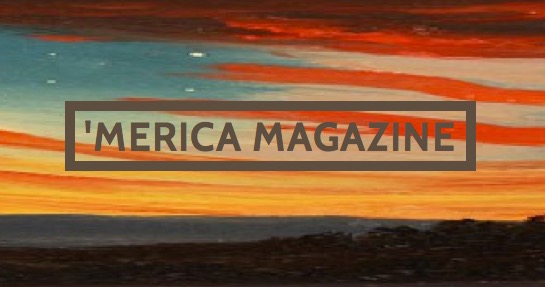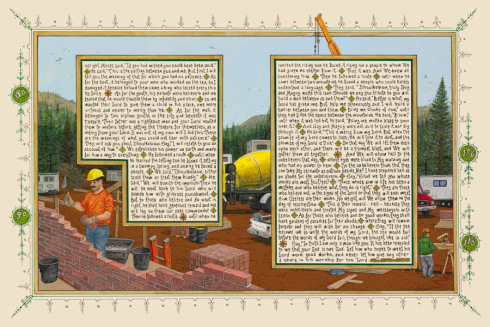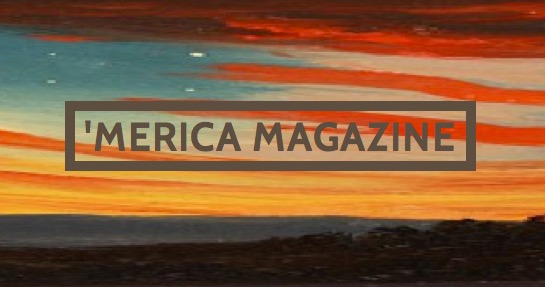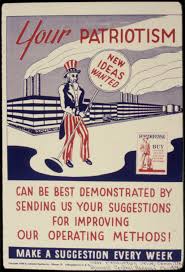Recently, current Lehigh English Department Ph.D. candidates and sole staffers of ‘Merica Magazine Ed Simon (Editor and Founder) and Wade Linebaugh (Assistant Editor) sat down to discuss their joint venture, graduate school, public humanities, and the finer points of laundry etiquette. Their banter has been edited for length and clarity.

WL: So the properly ‘merican thing to do would be to start with our origin myth, right? What made the whole thing start?
ES: I had first gotten the idea from some of the really good, popular magazines about religion for an audience which was educated but perhaps agnostic, and I am thinking specifically about Killing the Buddha. And I thought that how KtB has this great editorial vision of: this is stuff about religion for people who might be a bit suspicious of religion—I think their tagline is close to something like “religion for people uncomfortable about church”—that politics and patriotism needed something similar. So thinking about ‘Merica as a magazine for people who are more or less interested broadly in American stuff (if not Americana outright), but don’t feel comfortable with the more unpalatable aspects of unthinking patriotism.
And to the best of my memory I think we were talking about that while drinking beers on the MacGrady’s deck, and that was it. [Authors’ Note: we disclaim any responsibility for the closure of said fine wing-and-beer establishment, but we do mourn its deck & its cheesesteak selection.]

WL: Right! I remember sitting out there and we both had this outpouring of enthusiasm. Do you think something about our position as grad students had something to do with that passion?
ES: I don’t think particularly, I think the enthusiasm sort of grew out of our jokey “‘Merica!” thing over the past decade, though it seems like similar teaching interests of looking at Americana with our students definitely played a part in it. I know that I taught a class about five years ago called “Questioning American Exceptionality,” and that you’ve taught similar things. So some of the discussions and energy out of sharing that stuff with our students I think put us in that frame of mind.
WL: Maybe one of the things that drew me so much to it was the excitement of producing something aside from scholarship. As strongly as I feel about the value of scholarship, I think I personally got so enthused about the idea because it was something to feel like a writer about. And working toward the Ph.D. has a way of sapping that energy sometimes.
ES: Yeah, I think there is something to be said for “public humanities,” however exactly you may want to define that. It gets us out of the hermetically sealed environment of pure scholarship (and that’s not to say that I don’t think scholarship isn’t worthwhile), and to hopefully convey some of the insights of theory to a more general audience. I honestly find it really satisfying, that kind of process.
And I do think that we’re still trying to figure out what exactly ‘Merica is relative to that idea. When it began I envisioned it more like KtB, but as we’ve continued I’ve really liked some of our more traditionally literary things, like the poetry we’ve published.
WL: Yeah, it definitely is still developing. I’m getting the feeling it’ll change a lot over time, which is also pretty nice about the whole thing being ours: we evolve it if and when we want.
ES: What I read, what I want to write for, are places like The Atlantic, The New Yorker, Harpers, etc.,, and God knows we’re not that (yet!) but it’s the sort of writing that I personally find the most engaging and important.
[Change that “our” to “are” when this is printed…but leave in my request to change it.]
WL: Hah! Will do. Should we be good advice-givers now? Is this an insane thing for a grad student to do? Or is it the kind of pushing out from the traditional boundary of scholarship you think more of us-types should be doing?
ES: I don’t know exactly. I think that you should only do it if you want to do it, I think making it a CV thing is disingenuous in a way and it should come out of a genuine passion for the subject more than anything. Supposedly the public humanities is the next big thing, but I don’t know if that’s the case or not. It’s hard to say this is professionally advantageous, but even if it is, we could only do it because we believe in it.
Part of what sets it apart, too, is I think we’re careful to make sure it’s not a blog. Our writing appears pretty rarely on it—and blogging is great—but I see us as editors/stewards first of all. Some of what makes that approach possible has been our academic connections: people we’ve met at conferences, friends of friends, and so on. We’ve been really lucky to be able to get people like Jed Purdy to contribute stuff, but that’s sort of a unique thing as well.
WL: I can’t imagine treating ‘Merica like a CV line. I knew I was into the idea back at MacGrady’s but even then didn’t anticipate how attached I would become to the whole thing. It’s turned out surprisingly…personal?
ES: Yeah, I could see that.
WL: I think the other thing that benefited us was probably being further along in things, academically. The idea would have actually been legitimately bad if we were both, say, in coursework or in the midst of exams. Both at the level of time management and, possibly, in terms of having more clarity in thinking.
ES: I absolutely agree on that, and I think we’ve also got a pretty good sense of what the vision of the magazine is supposed to be. We want it to be intelligent, but not “academic.”
That’s not to use “academic” as a slur at all, but we’re not trying to regurgitate theory into it either.
WL: Bingo. It’s not that the depth of insight in academic writing is anything we’re against, but the barrier to entry for non-academics to read an academic piece can be so high. I think we both agree that we want to keep any possible barriers to understanding very low.
ES: And we don’t want it to just be more lighthearted writing for academics either, I think we both want a well-educated general audience. I mean, we want academics to read it of course!
But speaking of that, I do think we’ve got a bit of an audience problem though, maybe in the opposite direction, people who don’t get what we’re up to. That is one of the most frustrating things to me.
WL: I wonder if you thing that’s an us-problem, or a “public humanities” one in general? It may be specific to us with our chosen subject matter.
ES: I think it’s the subject matter, and the name, which is unfortunate. We get a lot of people whose politics are…not ours. Not our contributors, but our followers on Facebook, specifically. But at the same time when I tried targeted advertising to what I would hope would be a more sympathetic audience, they just passed it over.
There are times I’ve thought we’d do well to change the name, but the name is really part of the whole idea, so I’m hesitant. And doing so would also feel like capitulating, honestly. Which is all to say: I feel like the problem is less the public humanities than it is America.
WL: I also hate the idea of changing the name, but I guess there’s a kind of informed or well-educated knee-jerk dislike. A thinking that goes: “I’m smart enough to see through the myths that other people buy into, so why would I be patriotic?” That attitude bugs me when I stop to think about it, especially in educated and coastal readers passing on reading the site because of the name.
ES: KtB had similar problems. People thought the title was anti-Buddhist hate speech, and the name actually comes from a Zen parable.
I will say that to some degree you’ll always confront difficulties of audience, people who don’t bother to read, or don’t comprehend what they read, who just sort of have knee-jerk reactions to things, and I think we saw that with your American Qu’ran piece.
WL: The American Qur’an piece was rough! It was a lot of fun to get called Satan by strangers on Facebook right around Christmastime…

ES: Going back to the attitude you were talking about, but also the reactionary readers, they’re part of a similar thing—which I think is maybe the biggest risk—the polemic flattening out of everything so that people just have to be REALLY MAD, ALL THE TIME!
So I think the Public Humanities is entering as a concept at a good but dangerous time.
It’s good because maybe it has some of the remedies of patience, thoughtfulness, forbearance, and critical thinking that need to be more on display. But it’s also dangerous because that’s an incredibly uphill battle.
And I think you see that played out: people clicked “Like” on our magazine because they were like “Flags! Eagles! Yeah!” and then they see all of our lefty pinko stuff and they’re like, “What the hell is this?!”
That aspect does actually make me a lot less sad than progressives who have passed us over because they made the same assumptions about our content.
WL: I definitely see how public humanities could be a useful antidote to the flatter, less-nuanced world of online publishing. If our world in general had more Ta-Nehisi Coates and a little less “…and you won’t believe what happened next!”, we’d probably be in a better place.
ES: And there are great forums for that kind of stuff, like The Atlantic obviously, but also the New Inquiry, Jacobin, and so on.
WL: To go back to being ignored by generally lefty readers because of our attention to Americana and American culture—that assumption that we’re therefore jingoistic?—that’s easily the hardest pill to swallow for me.
ES: Yeah, those readers discounting us because of the name is super troubling, and I’d argue doesn’t bode well for the progressive movement as a whole. I thought the over-the-top patriotic imagery was pretty obviously tongue-in-cheek, but we also seem to be living in a post-ironic age, or a-nothing-but-ironic age, or, I don’t even know anymore…
That stuff gets ironed out though, hopefully, as you move forward.
WL: It all reinforces for me, at least: to just do our thing and let people come around to it. Maybe it’s not the savviest approach but I can’t figure out the zeitgeist anyway, much less optimize our appeal to it.
ES: Yep, exactly. We’re pretty good at promotion I think, for a young publication, and at least some people know we’re out there. But that aspect is in my opinion one of the hardest parts of the whole venture.
Our growing stable of people we like who submit things to us and who seem to like us, I think they get what we’re up to. I’m also under no illusions though: if we end up having success I think that comes in five, ten, fifteen years. Which is also another reason that a project like this isn’t just a CV line for people. Not to mention that if you want people to read your own work, it’s bluntly far easier to try and get published with a site that has a built-in readership in the thousands, which we don’t have yet.
WL: The long haul is the only way to make something like this work, short of a slick or well-funded marketing campaign funded by some infinite money spell.
ES: Yeah, money or being able to host events in a larger metropolitan area (which, of course, also needs money) would help!
WL: So how about turning to the practical concerns of a graduate student: do you think ‘Merica has helped us or will help us as we move past the apprenticeship phase of our careers, as we’re both more or less ready to do soon?
ES: I think in terms of getting a variety of editorial experience it’s possibly helped, though I think it’s important that it’s not really training for stuff you’ll do as a traditional academic. Maybe if public humanities gets the attention it deserves in the academy, and certainly if people involved with this type of thing opt to go the alt-ac route, I think it could be useful in that sense. I think my dream was always something like this would end up being sponsored by a school that was interested, and that funding/support could come through that and there would ultimately be a bigger cast of folks than just us.
And this sounds goofy maybe, but I do think the technical aspect of designing the site and so on has been weirdly useful to learn—
Be right back, I need to go to the laundry room. [Put that in, and put in that I told you to put that in.]
[Ed begins to depart but fails to actually do so]
ES: Before I do that though, I do think that one practical thing grad students could think about, is what sort of academic currents they find really exciting that they think could sustain something like this.
So we basically write around American Studies myth and symbol school, which is of course a bajillion years old and less than fashionable (which I think is part of why we’re doing it), but there are fascinating disciplines that deserve attention by the wider public that could at least structure the editorial vision of something like this.
[Somewhere in the course of the following response Ed actually does leave and come back.]
WL: I agree that if nothing else, working (even at a rudimentary level) with the web and diversifying editorial experience is a fundamental good. That’s something any grad student can do and will help them out indirectly but in countless ways. There are ways to do that, though, that are a hell of a lot easier than starting a goddamn magazine.
To the other point, even if the scope of our project isn’t the kind of thing everyone needs to be interested in trying themselves, the way we’re thinking about things could be useful for lots of students in our position. It’s good practice for thinking through subjects in big, multidimensional ways, and learning to write about them in ways that are oriented toward the public is a real and valid skill.
OK, should we call it a night? I think we can leave it at that for now, since we’ve dispensed something like advice.
ES: OK, but put this in: people who don’t take their dank, finished laundry out of EVERY SINGLE MACHINE are monsters.

Check out the substance behind the banter over at ‘Merica Magazine. We’re always looking out for fresh voices and great writing, so be sure to check out our submission guidelines over here, and don’t be shy about submitting!
And since we’re here among friends & colleagues at Drown Unbound, we’d love to hear what you have to say about public humanities projects, the many worlds of online publishing, or laundry etiquette. Thoughts on the career benefit (or timesucking detriment) of public humanities projects for graduate students? Questions for us about what goes into editing the magazine? We’ll hang around the comments so let us know.



One thought on “Ex Academia ‘Merica”